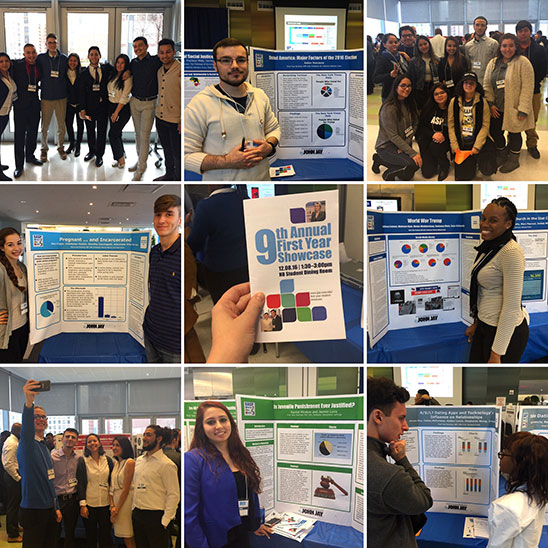
Scores of John Jay freshmen and transfer students stood proudly alongside poster presentations and other research efforts in the Student Dining Room, showing off their projects as part of the 9th annual First Year Showcase.
Entering freshmen at John Jay, who can choose from dozens of Learning Communities or First-Year Seminars, presented their research alongside new transfer students, joined this year by students from the APPLE Corps (Academic Preparation Program for Law Enforcement); Early Start (for pre-freshmen); Adelante! (academic success program for Latina/o students); the John Jay Honors Program; Interdisciplinary Studies Program; SEEK (Search for Education, Elevation and Knowledge); OSS (Opportunity for Student Success); the Philosophical and Cultural Foundations program; the Research and Inquiry program, and Justice First-Year Seminars.
The First-Year Seminars are part of John Jay’s General Education curriculum. The students in each Learning Community are taught by two or more professors from different disciplines. In many cases, students work together as teams on research and other presentations, grouped either by their own choice or at the suggestion of their professors.
The research — 83 poster displays and 60 digital or multimedia presentations — covered a broad array of topics ranging from gender issues to police practices, from immigration to education issues affecting college students, all of which were presented with poise and nascent professionalism. “Could I ever have imagined I’d be doing research like this as a college freshman? No, not at all,” said Celine McFarlane, spokesperson for a five-student team that studied “Dating Apps and Technology’s Influence on Relationships” for a First-Year Seminar taught by Professor Ric Curtis. “High school didn’t prepare us for this,” she said. “Warned us, but didn’t prepare us.” McFarlane is an English major from Queens who attended Civic Leadership High School.
Presentations were as creative as they were diverse, with many students opting to research issues close to their own personal experiences. For “Gentrification Nation,” Amable Reyes, Shannon Paige Monteron, Yorleny Fernandez, and Genesy Espinal of the APPLE Corps program visited three New York neighborhoods to track changes over the years. Students in an Anthropology 101 class taught by Professor Yolanda Martin, they concluded that residents perceive their neighborhoods as less close-knit than they used to be, leading to difficulties in community problem-solving.
Hope Gatto, Tiara Arjoon and Alana Pepe, freshmen in an Early Start course taught by Professor Bettina Murray, researched “SASP [Student Academic Success Programs] and the Outsider,” and came away with a comprehensive appreciation of how extensive and meaningful John Jay’s SASP program is. “Compared to other colleges, SASP at John Jay is bigger and better,” said Gatto, a Criminal Justice major from Saddle Brook, N.J. Pepe noted that Early Start, through which the students met in a summer school course, gave them an edge in their transition to college. “From my personal experience, I can say the Early Start helped me a lot,” she said, “although I thought it was just a summer class. Now here I am doing research.”
Rachel Mirakov and Jasmin Luna, students in a Philosophy 102 course taught by Professor Genevieve LaForge, explored the question, “Is Juvenile Punishment Ever Justified?” Through their research they found that juveniles often receive harsher sentences than adults. “I find it devastating when kids are tried as adults,” Mirakov said. “People need to be treated well and not looked down on.”
In a similar vein, Gary Cruger and Nikki Soto, freshmen in the Interdisciplinary Studies Program, presented a poignant examination of prisons in a study titled “Pregnant...and Incarcerated.” Speaking on behalf of a team that also included Volodymyr Kaskiv, Dorothy Caccioppoli and Alexander Flint, Cruger said he came up with the topic based on discussions in a class led by Professors Marcie Bianco and Kofi Scott. And, as their project evolved, Soto said, “We found there’s not a lot of research on this topic.” The pair said they hoped there freshman research would open the door to follow-up studies. “Maybe we can start a movement,” said Soto.



